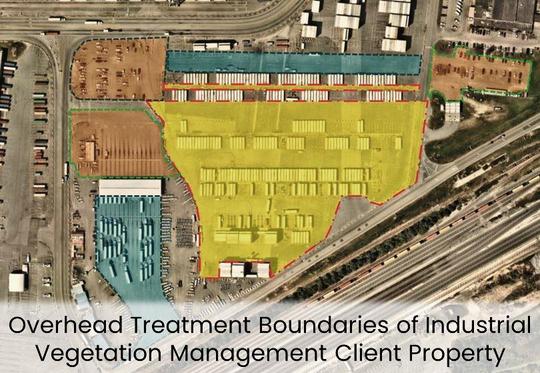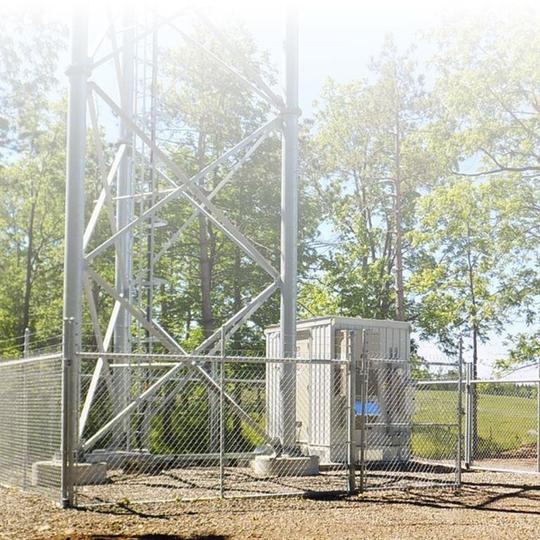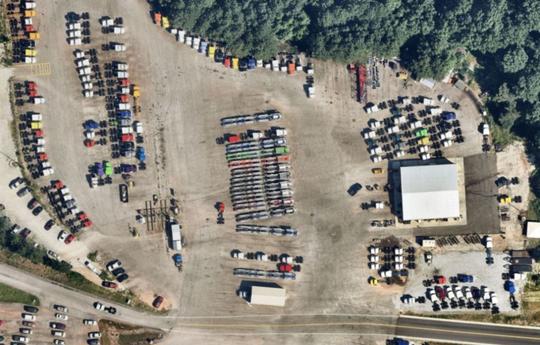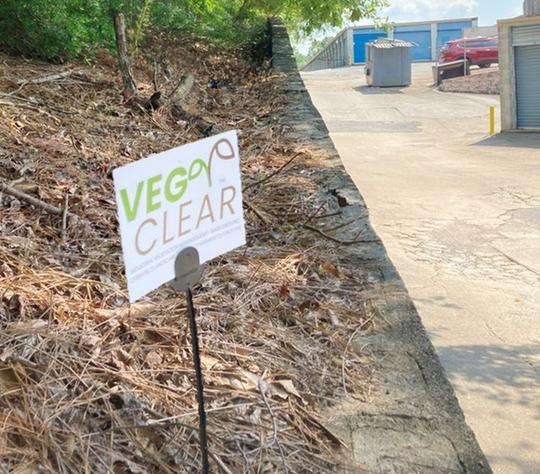
You Are Here: VegClear Home > Property & Services > Commercial Weed Control
Commercial Weed Control And Selective Vegetation Spray Treatments
Industrial Weed Control For Commercial Properties
A strategic approach is the key to sustainable low cost maintenance. Overgrown vegetation hinders your industrial operation, reducing economic output, increasing hazards, and posing fire risks. It can also obscure and damage fence lines, jeopardizing security.




overview of challenges faced From unmanaged vegetation
Fire hazards: Mitigated with VegClear's total vegetation control and bare ground commercial weed spraying services Equipment shading: Prevented with industrial herbicide applications and vegetation control services that also include growth regulators Security risks: Overcome with industrial weed killer services, kudzu abatement, and Clear Line vegetation perimeter control
How to Manage Weeds on Industrial Properties
Weeds on industrial properties can quickly escalate into significant problems, especially during warmer months when invasive species grow unchecked. Addressing weeds early—before they mature and spread—is critical for maintaining control. Once established, many weeds develop extensive root systems, making them far more difficult to eliminate. Adopting consistent, year-round weed management practices is essential for controlling growth and maintaining healthy vegetation. The following methods are practical steps for managing weeds effectively, particularly for those overseeing in-house landscape maintenance teams.
Maintain a Clean Landscape
Regularly clearing debris such as leaves, branches, and brush is a simple but effective way to prevent weed infestations. Sunlight must reach desirable plants and turf to encourage their growth, and accumulated debris can create ideal conditions for weeds to thrive. Debris also raises the risk of mold and plant diseases. Consistent raking, trash removal, and maintenance of landscaped areas ensure weeds are less likely to take root and spread.
Apply Preemergent Herbicides Strategically
To control weeds proactively, remove all visible weeds using hand-pulling, herbicide applications, or mechanical cutting. Once the area is clear, apply preemergent herbicides to block new weed germination. Products such as oryzalin and trifluralin are commonly used, but it’s vital to ensure they’re compatible with your existing vegetation. For industrial properties with in-house teams, verify application details with a vegetation management expert or local extension office to avoid unintended harm to desired plants.
Most preemergent herbicides require post-application watering to activate their effectiveness. While these products are excellent at stopping new weeds, they won’t address established perennial weeds with mature root systems. For stubborn species, additional treatments or full root removal may be necessary to prevent regrowth.
Designate Pollinator Gardens to Support Biodiversity
Pollinators such as bees, birds, and other small animals play a vital role in maintaining healthy ecosystems. Establishing dedicated pollinator gardens can help foster biodiversity while isolating flowering weeds like clover, dandelions, or purple deadnettle. Keeping these plants in a designated area or raised planter allows pollinators to thrive without compromising other vegetation. For industrial property managers, this approach provides ecological benefits while maintaining control over invasive weed species.
Prioritize
Plant Health
Healthy plants naturally outcompete weeds. For in-house teams, focusing on regular maintenance such as fertilizing perennials, pruning trees and shrubs, and removing dead or diseased growth will strengthen root systems and make desirable vegetation more resistant to weed intrusion. Depending on your region, fertilization may be required two to three times annually. However, excessive fertilization can weaken plants and create conditions for weeds to flourish, so always follow recommended guidelines.

Implement Drip Irrigation Systems
Drip irrigation provides water directly to plant roots, minimizing surface-level moisture that encourages weed growth. Unlike sprinklers, which water indiscriminately, drip systems deliver targeted hydration, helping your plants thrive while reducing opportunities for weed seeds to germinate. For industrial properties, this method is efficient and supports long-term vegetation health.
Choose Appropriate Ground Cover Materials
For landscaped beds, installing suitable ground cover can significantly reduce weed problems. Remove existing weeds thoroughly before applying mulch, gravel, or rocks. Landscape fabric beneath these materials can offer additional protection. However, be cautious when using mulch; ensure it is seed-free to avoid introducing new weeds. If in-house teams use mulch sourced from free wood chip programs, verify that it has been treated to prevent contamination.
Consider Professional Support
Managing industrial landscapes effectively requires time, expertise, and consistent effort. Even well-trained in-house teams may face challenges with large-scale weed problems or persistent invasive species. VegClear provides professional vegetation management services based on the unique needs of industrial and commercial properties. Contact us to discuss your weed control requirements and explore solutions to keep property well-maintained and weed-free.

-
Reduce Mechanical Labor Costs
Minimize reliance on costly labor and time-consuming mechanical trimming on areas VegClear applies herbicides and preventives.
-
Cost-Effective Gravel Weed Control Solutions
VegClear is a weed treatment company near you. Our approach is a cost-effective alternative to relying solely on mechanical cutting.
-
Outdoor Storage Weed Management Solutions All Year
Achieve year round vegetation control with annual spray programs & quarterly applications, proactively controlling potential problems.
-
Weed Seed Suppression
Prevent spread and reduce overall invasive vegetation, ensuring a clean, more efficient industrial operation, limiting new seed growth.
Meeting the Vegetation Management Challenge
Georgia, South Carolina Based Reliability You Can Trust Across the Southeast US
Selective Herbicides & Growth Regulation: Our crews target tall weeds & grasses, suppress seed heads, and promote low-growing, desirable grasses. Total Vegetation Management: Keep parking lots, roadways, and gravel areas clear of unwanted growth through total vegetation control solutions. Fence Line Security: VegClear treatments ensure vegetation doesn't compromise security, visibility, or damage electrified fencing. Storm-water Management: We help maintain effective storm-water management systems, including retention ponds, gravel ditches, pond shelves, drainage culverts, catch basins, and underground retaining systems.
Shaping the Industry of Industrial Weed Control and Vegetation Management
As utility-scale solar facilities continue to evolve, owners and utility companies must adapt to maintain efficiency and profitability. Herbicide science, expert contractors & treatment documentation digitization will continue to play a role in mitigating issues before becoming costly problems, keeping solar properties operating at their best.
Connect with Us: For inquiries about vegetation management solutions and to discuss how our services will benefit your operation, please contact us today. At VegClear, we are committed to productivity, ensuring the longevity and efficiency of your industrial or commercial real estate investment. Our team of licensed experts is here to support your team with your vegetation management needs. Work with VegClear for a cleaner site, greener future, and preventing growth where it's unwanted.